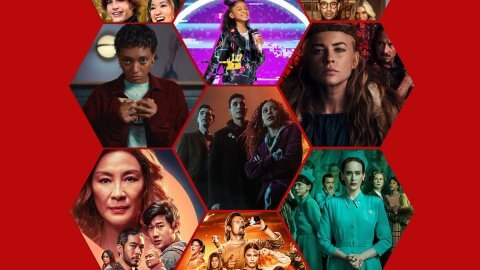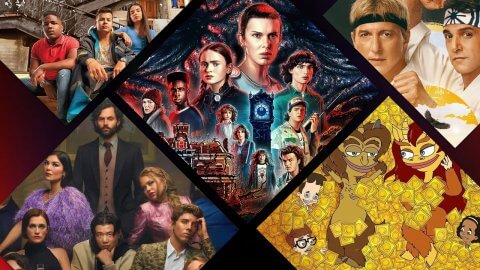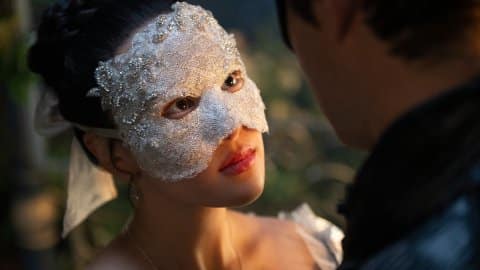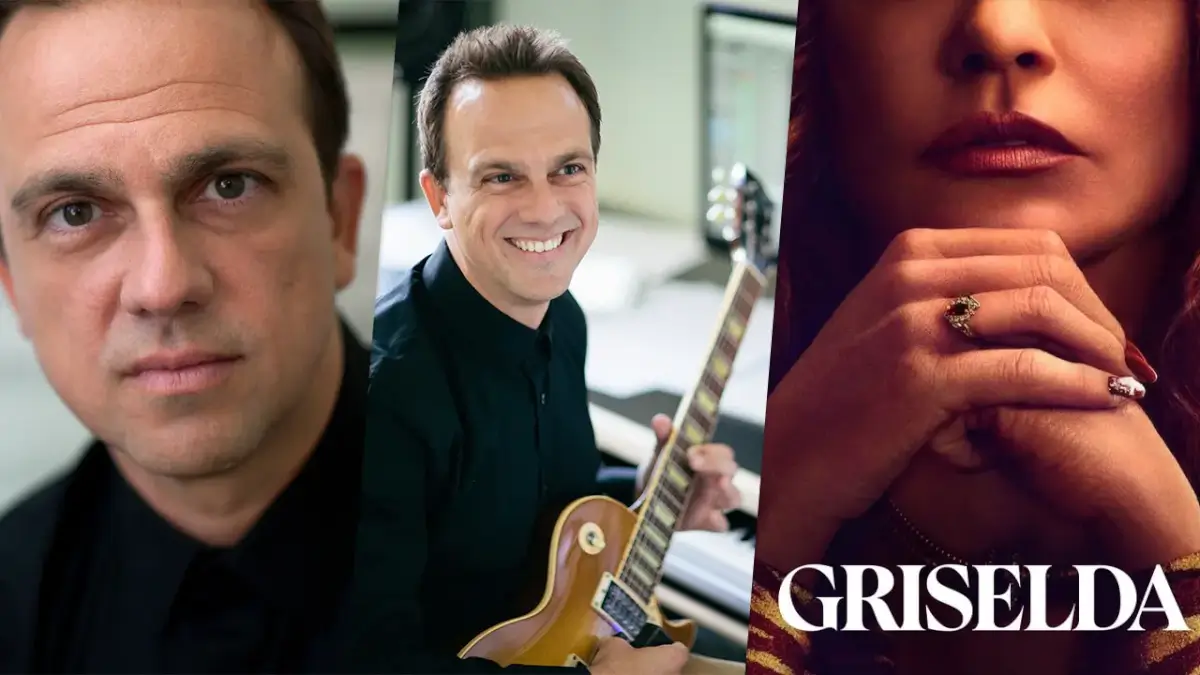
Picture: Carlos Rafael Rivera
We recently had the pleasure of discussing the score of Netflix’s latest crime drama, Griselda, with two-time Emmy award-winning composer Carlos Rafael Rivera.
Griselda is a limited crime drama series created by Carlo Bernard, Ingrid Escajeda, Doug Miro, and Eric Newman. The series was directed by Andrés Baiz and composed by Carlos Rafael Rivera.
Sofía Vergara starred as the lead, Griselda Blanco, and was an executive producer.
Before walking on Griselda, Carlos Rafael Rivera worked on mini-western drama Godless and viral drama The Queen’s Gambit.

How did you first become involved with Griselda?
Carlos: I found this out later, but Griselda came because Tori Fillat [Netflix Director of Music Production] from Netflix, who had worked with me on a few other projects, recommended I do this one to Eric Newman, who’s a producer. Eric Newman called me, and I’ve known Eric through the years because I mentored with his father, Randy Newman, who it’s a miracle I get to even mention his name without sounding like I’m lying to you. But I did get to mentor with him through USC [University of Southern California] when I was a student there as they did a mentorship program. I was just able to go to sessions and watch him work. We stayed in contact over the years, and it’s been almost 20 years that I’ve known the man, and he sometimes takes my calls. So that’s great.
But anyway, the point is, his son’s a producer. And he was working on this show. And he called me and asked me if I wanted to do it. So that’s how we started working. And then I started talking to Andi Baiz, a director, and it was just a great experience.
How would you describe your score for the series?
Carlos: That was born out of my conversations with Andi Baiz. We were trying to find something that would reflect the time, which is the ’70s and ’80s. And it’s a narco story, so I always think of Scarface. It is a movie that I grew up being a big fan of and has a lot of synth music. So basically, we started with a playlist he [Andi] made of synth music, and he sent it to me. Then we were talking about it, but I hadn’t written anything. We were having conversations, which was fun.
Because there was no “Hey, write something and tell me, and I’ll let you know what I think,” which is usually what happens. This time, it was more let’s keep talking about it. Let’s see if we can find what we’re talking about. The playlist was incredible. Then we started talking about classical music, and he made a classical music playlist. And when I heard that, I was like, man, this could be — because it’s always larger than life.
When you have these kinds of stories, characters like this, read like a lie, and their stories that you tell someone else and share with someone else, and they’re like, what!? She did- What did she do!? So you have to think musically that writing the kind of music that goes along with the larger-than-life stuff could be a mistake. Or you may play a restraint score.
But we figured, why not make it operatic? What if we treat her story like an operatic story? And then the music was born out of that idea.
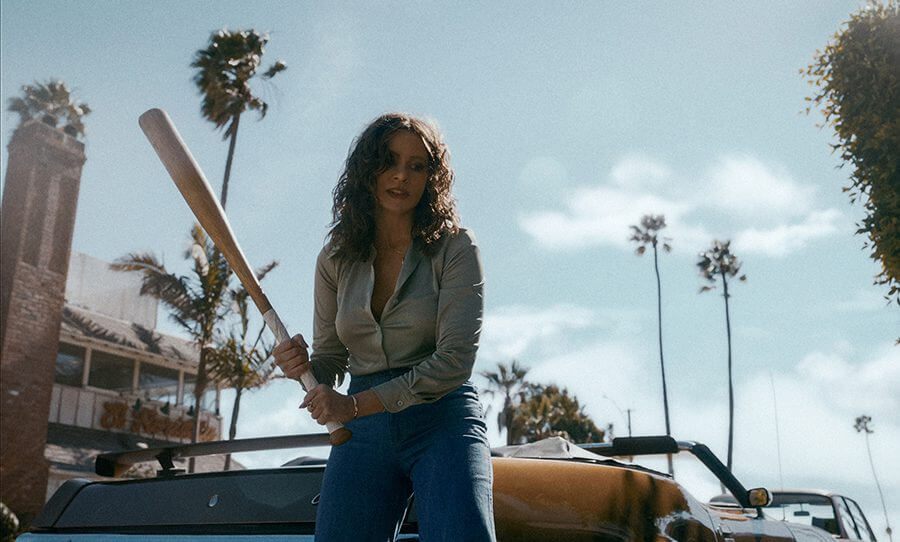
Griselda. Sofia Vergara as Griselda in episode 101 of Griselda. Cr. Courtesy of Netflix © 2023
Jacob: She [Griselda] definitely came across as larger than life, and the music reflected that. I think for quite a few of the characters, they seemed larger than life.
Carlos: Yeah, no, it was a blast, man. Because, I mean, some of the characters I fell in love with, there’s a character we’re seeing in the show called Rivi. Every time I got a scene with him, I couldn’t wait to work on the scene because he chews the scenery. Sometimes, things are so over the top that they don’t read that way. They just read. And you’d think it’d be the wrong way to go. But it was like we were having fun in the storytelling process.
So, with all these characters, you get to punch them up even further. Because if you think about operatic music, it’s harpsichord and choir, a trope. Anytime you imagine the word choir, you’re probably thinking of epic, right? So choir was part of it.
We had a choir with the orchestra. Then, the harpsichord was the idea of in the classical era; during the opera, when someone was doing an exposition of a character or a character would start giving exposition, they would do what’s called a recitative, which is like the harpsichord plays a chord, it’s a continuum, they’re playing, and they go, now we’re going to walk into the thing *imitates the chord*. That idea was the concept behind her speeches because she would give these speeches, and what if harpsichord accompanied them? The most important thing is that Andy was into it. We wouldn’t be discussing this if he hadn’t been into it. I don’t know what we’d be talking about. But it wouldn’t be opera.
So, it’s always important for me to share this because, usually, it’s a very collaborative process. It’s not like I go, well, we’ll do opera. No, it was a collaborative process. By the time I started writing, we were already mentally dialed in, and it just took off from there.
Jacob: Ironically, you mention Rivi because I listened to the soundtrack after I binged all six episodes. And as I was going through each of the characters’ different themes, the one that caught my ear was Rivi’s. It almost has a cheekiness, but you were immediately drawn to him whenever his character came on screen.
Carlos: I think he’s [Martín Rodríguez] a virtually unknown actor. I think a lot of the cast is virtually unknown, at least to American audiences or global audiences in a way. Some of them have worked quite a bit in Latin American television. You know, I think he had about 1000 followers on Instagram. And I can’t wait to see where he’s at now.
He’s probably at 10,000 and over a weekend. I hope he keeps working because I became a fan. After all, that kind of acting is committed. And it’s an excellent performance. And I don’t want to only talk about his performance. Sofía Vergara killed it, and I don’t think we’d be getting these interviews and the support from Netflix if she hadn’t delivered on the role. Because I would, as anybody, would have been apprehensive from the premise. She’s known for a comedy, you know, and then she comes steps into this world, and all of a sudden, when I was watching the dailies, I was like, Oh, man, and I also really respect Andi Baiz’s vision.
They have the experience from Narcos, he and Eric Newman. So, there’s a really clear understanding of the craft and how to tell the narco story. And here, it’s almost like they’ve elevated and grabbed some fantastic elements from it and supported her performance, where she delivered. So you never know how things are going to turn out. And I was excited, if anything, that I was getting to be part of something that felt special.
I didn’t know if people would binge it like you did. I was just proud that I was like, Oh, my God, we committed, we took a lot of risks, from the music to everything else that Andi envisioned. So, without a doubt, I’m a huge fan of Andi Baiz now.
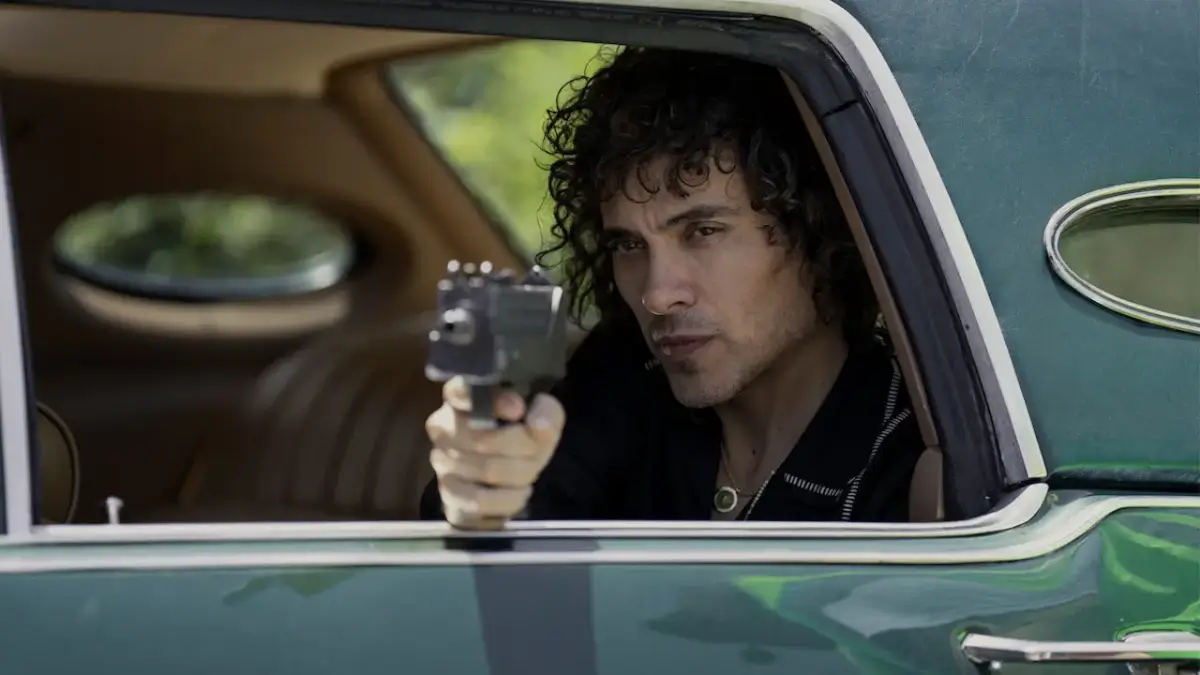
Picture: Martín Rodríguez as Rivi – Netflix
Jacob: With the music, it sounds like there’s a big collaborative effort there. Was there much room for experimentation?
Carlos: You know, it’s weird because usually we have what we call spotting sessions, but it’s show and tell. You’re in post-production, and you’ll meet once a week with the showrunner or director and whoever’s approving and show them the cues you have. They have a meeting with music, then they’ll have a meeting with sound, and they’ll have a meeting with visual effects, and they’ll have a meeting with, you know, all these different post-production teams. The way I like to describe it, it’s like the eye of Sauron, you know, because you’re standing there, and all of a sudden, the eye of Sauron turns on you, and you’re like *gasps*, and in that very short amount of time, they’ll say, Yes, I like it. I don’t like it. Yes, I like it. I don’t like it. I like it. I don’t like it.
It’s a very normal process that what we do is revisionist. I write something, and then they’ll be like, yeah, but I don’t like the ending. Okay, well, we’ll come up with a different ending. And we meet next week. We have the new cues, plus that ending revision. Does that make sense? It’s sort of the process.
This was a unicorn thing because the way the setup is that the first scene of the show after we had already talked about opera, and all of this was the first scene I scored, but he sent it to me, and he sent it to me going “I don’t think this needs music, I just want you to check it out. So you can get a sense of the character and her desperate situation.” I knew the story. I’d read the screenplays, but he goes, “I want you to sense how she’s delivering this for tone.” I was like, this is awesome; I’m a fan first. So getting dailies or access to things is like *gasps* I feel like I snuck in the back of the set or something. That feeling has never gone away.
So I got in, I got the scene, and as I watched it, there’s a moment when her hand is revealed with blood as she’s coming up the stairs, and it kind of pauses on her hand. I had my phone, and I always wrote in different ways, like on the piano, but I’d usually sing to a scene into my phone for the visceral reaction. So, all of a sudden, when I saw the hand, I was like *imitating an instrument* then, all of a sudden, I stayed quiet, and then I did another one. I was like, holy crap, this is kind of over the top, probably, but what the hell, and then so I brought that into my DAW digital audio workstation. And then I just fleshed it out to piano, orchestral stuff, choir, English horn, etc. And I sent it back to him [Andi], like, you know, in a few, two, three days. I was like, I don’t know, man, maybe it doesn’t need music, but check it out; it’s probably over the top. You know what I mean? That was expecting the rejection or revision, but he came back to me and loved it. I was like, “No way!?” I just got excited because the creative freedom was very unique in this case. Once he liked it and loved it, there were very few notes that I ever got from Andi. There were two notes from Netflix, and usually, there’s a lot, and that’s not a bad thing; it’s a normal part of the process.
So, we just really went there. I think it comes from the fact that they trusted Andi so much and that he was so trusting of me. Yeah, I know that won’t happen again, even if I were to work with him again, if that makes sense.
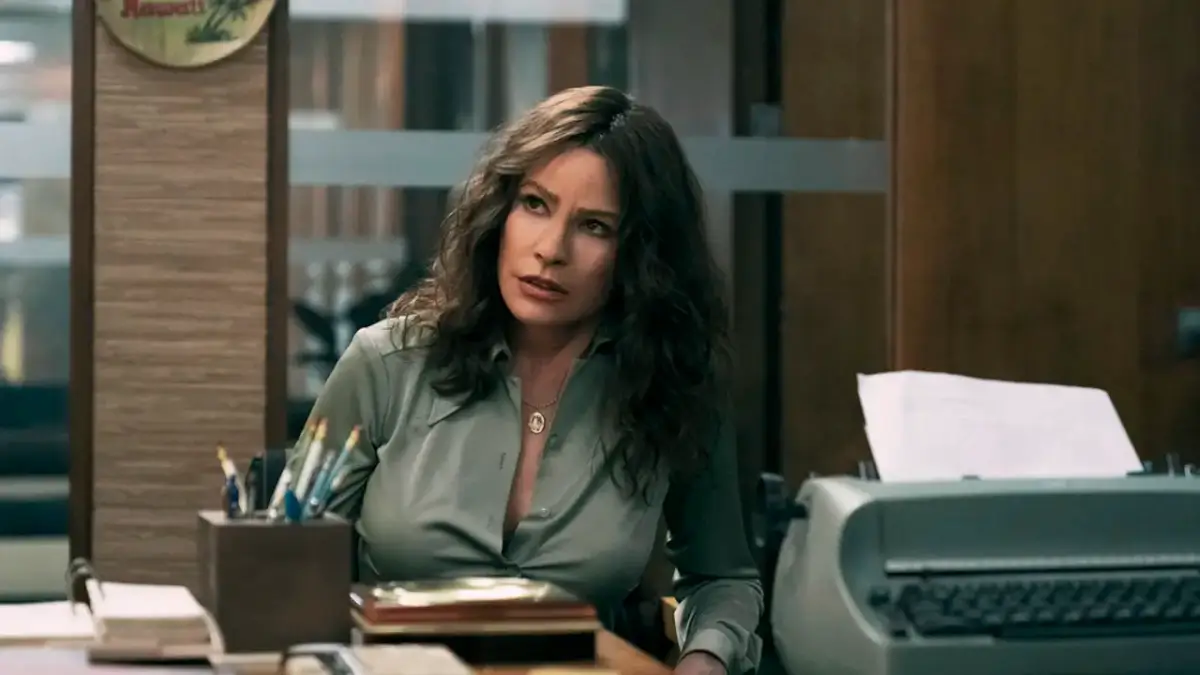
Griselda. Sofia Vergara as Griselda in episode 101 of Griselda. Cr. Elizabeth Morris/Netflix © 2023
Jacob: Because of Eric Newman and those who previously worked on Narcos and Narcos: Mexico, I was expecting more of a Latin flair to the music, but I was pleasantly surprised by the score. It made the story feel larger than life. When the music hits, you realize this woman is a big deal.
Carlos: Yeah, man, I mean, again, I’m telling you, I’m as surprised as you are that it worked. When you do these things, you’re doing mellow drama, your melody to the drama, right? I’m always trying to tiptoe around wherever the word cheesy is. But you can always hear it in the insertion of the music. By nature, it sets up a potential screw-up.
This was beyond my expectations, so when it worked for Andi, I was excited and trusted it. There’s a cool shootout sequence for Amilcar when he’s getting chased by June. When I started writing that, I thought he would reject it because it was full-on classical. Is it a little cheesy? I was thinking whether or not I had gone too far. But he allowed it, and we went there; I still don’t know, but I’m excited that it’s working for people.
So again, it’s weird, as the point I’m trying to get across is there’s no confidence in it. It’s almost like a risk you’re taking. Was I to be like, “Oh yeah, and then we did classical..” no, man, I got lucky that Andi approved, and then it stayed there, and now here we are talking about it.
So thank you, man. I appreciate you liking it, you know, more than anything else. That means the world, man, to me for real.
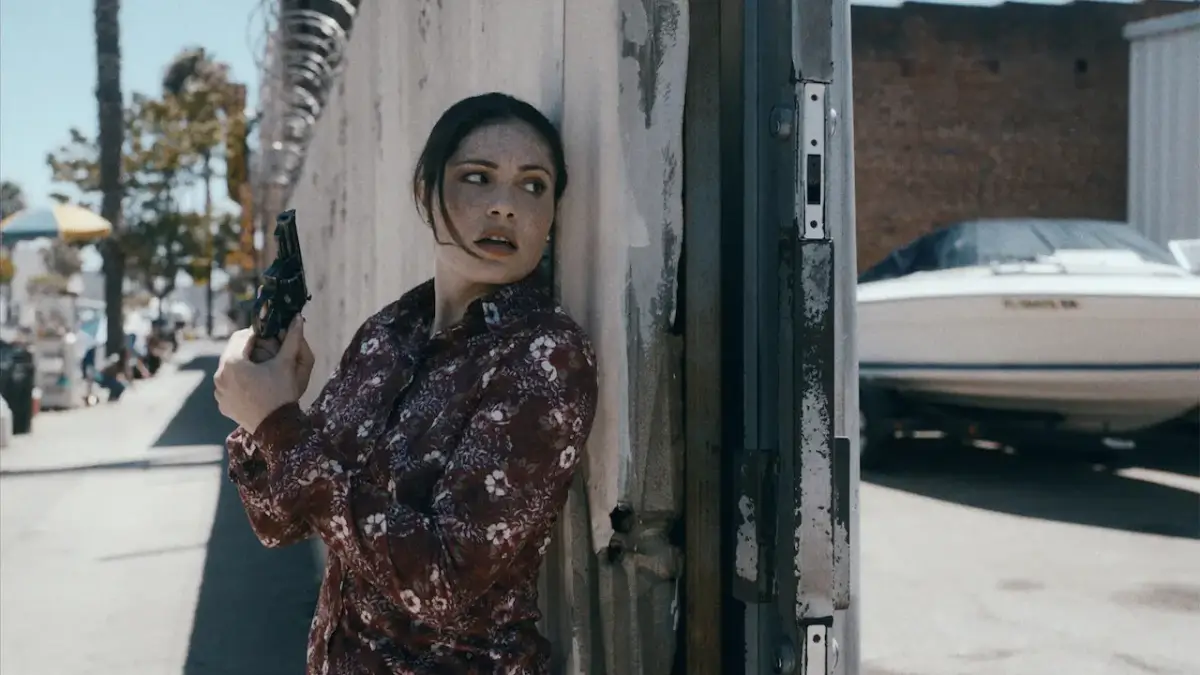
Picture: Juliana Aidén Martinez as June – Netflix
Jacob: It was a great score. What worked well was pairing the late 70s and early 80s club music, and then you have this powerful score for the more serious moments. The contrast worked well.
Carlos: Yeah, that was Liza Richardson’s music supervision. The idea of the chosen and clear songs is that you’re listening to an era that’s very well depicted by its music. That was the other reason why doing a synthesizer score may not have worked when we were talking about it: the songs were putting us in that time and place, taking care of that for us. So the score could take the risk and go to the classical era and just go off and be operatic.
What inspired you the most to pursue a career as a composer?
Carlos: I’ve loved music ever since I was a little kid. I took piano lessons when I was six, but then we moved from Guatemala to Costa Rice. Then, that eventually ended, and I went to Panama. My Dad wanted to play guitar because he’s a great singer. He was a fantastic singer of Cuban music, just singing to no one in the living room belting out. I wasn’t, you know? None of us even. I don’t even know if my kids will ever have that natural, beautiful tenor voice he had.
So he wanted to learn how to play guitar, and then got my brother, myself, and himself to take guitar lessons in Panama. Then, I started doing the scales. However, my brother didn’t follow through, my dad didn’t follow through almost at all, and I was just doing scales.
Then we moved to Costa Rica, and my brother, using what he learned, picked up the bass and joined a band. He was four years older than me. So I kept playing the guitar, but he wouldn’t let me in; I was like 13, and he was 17 and busy hanging out with his band. The band was called Radical Trip, man, and it was a cool thing.
So, we moved to Miami, and I was getting older, and I kept playing and playing and playing. Then we formed a band together, doing a lot of progressive rock stuff like bands like Rush and all the 80s bands we started doing. Then we became a cover band, so I was doing that. But, once I started writing songs with my brother, it was like that creative thing; that was the kind of impetus that I was like, oh, this is cool. We can write songs, man. Then, I went to college and started pursuing classical music.
But the stuff that inspired me, honestly, my brother and, I’m so old that we had a Betamax in Central America. And we would record movies. Before that, we would record on our cassette player movies, and we would listen to the movies in our room on the cassette. So, we would listen to The Great Train Robbery to Star Trek: Wrath of Khan; we’re talking about movies from the 80s and 70s. So music and that sort of oral experience always helped. You know, I don’t even know I’ve answered the question.
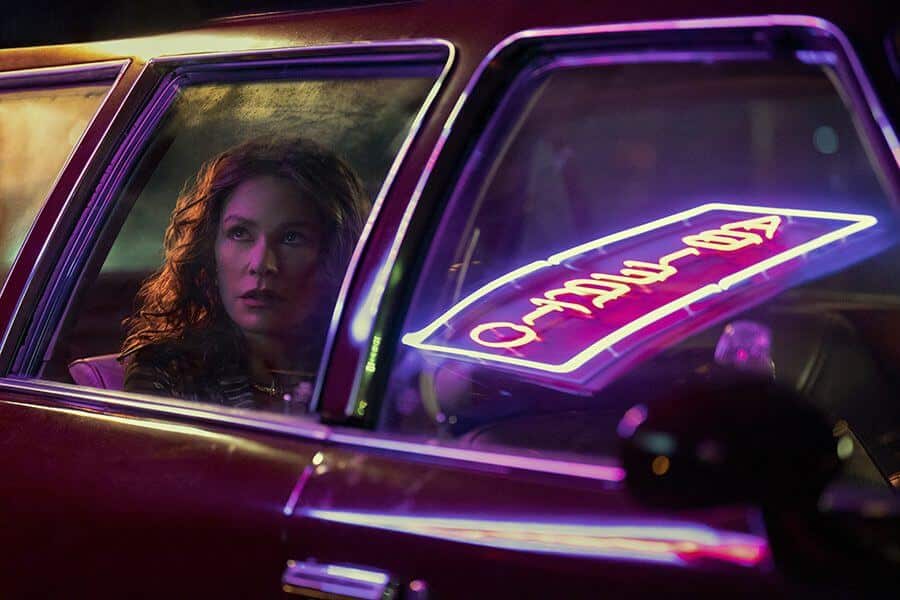
Griselda. Sofia Vergara as Griselda in episode 101 of Griselda. Cr. Elizabeth Morris/Netflix © 2023
Jacob: You’ve answered it wonderfully. One of the lucky things I get to do when interviewing composers such as yourself is that natural love of the craft, and that always shines through. It’s always great to hear what started that journey for someone like yourself.
Carlos: Oh, man, no, yeah for sure. I used to cry listening to stuff. I mean it was definitely an emotional aspect just the big jump was moving to the United States, and I never thought I’d get to do it. And I did believe that composers and musicians were born on other islands or may have been from different planets. I remember seeing a commercial for a Fender guitar, and I was like, wait… you can buy that!? You can buy that!? Like I couldn’t fathom getting an instrument and learning and working my way up at all. It wasn’t until we were in the United States that we started playing bands, and then eventually, when I moved to L.A., I met a director.
I was like literally freaking out. I was like there are different people to me and my upbringing; they are just another class of alien, literally. So, it took a long time to normalize that and realize it was possible. I feel fortunate. But, inside, I still freak out most of the time when meeting people and musicians I respect and love, or, you know, there’s that ‘fan first’ thing that’s never left. And I’m grateful for that.
Jacob: So, with the series being set in Miami and some parts of Colombia, is there any influence in the music from those places?
Carlos: Yeah! I mean, before I got into the film thing, I got fortunate about 12 years ago when I studied classical music. So, I went to university and got my doctorate in classical composition. But what I was writing was music that had Latin American influence.
I was trying to understand it as it was born from my dad, who played Cuban music at home, right? So he would play Benny Moré and all the Cuban stuff. And, I was like, ah, dude, I just wanted to listen to Boston or Journey or whatever bands were, you know? I was as anti-cultural. I was just as Americanized as I could be in Central America. I was listening to the rock bands with my brothers and my sister.

So, when I was in college and I started studying music, all of a sudden I paid attention to this Cuban piece that had a clave in it, and I was clapping along. Now, in Miami, there are a lot of Cuban musicians. They’re like Man, you are certainly not Cuban, and I’m like, “I’m half Cuban! My mom is from Guatemala, and my dad is Cuban!” That’s when I was told I was clapping on the wrong beat. I was like, what do you mean that’s the wrong beat? I was clapping at the end of four when I was supposed to be clapping at the end of one, which is after that. So, at that moment of the rhythmic thing, the trick and understanding of how that was working and the fact that I had grown up listening to a rhythm a particular way and that it wasn’t correct was mind-blowing. And this is great, it’s an example of what happens in rock and roll music, and music in general.
Bands like Rush have mixed meter in their music, but you know, the opening of Jailbreak 74 by ACDC, when you listen to that, you know, that little moment when the rhythm is flipped. Or Kiss That Frog from Peter Gabrial; when you listen to the beginning, most people can’t follow where the downbeat is. That’s the same thing that happened to me with Cuban music. So when that happened, I went down the rabbit hole and started listening and learning all the different things about Wawanko, Rumba, Rumba Columbia, and all these different rhythms. So, when I was writing classical music, I started influencing it because I became fascinated. When it expanded into Latin American rhythms, from Mexico to Argentina, and the birth of the tango, where did that rhythm come from? It comes from this rhythm that, oh my God, the habanero rhythm influenced jazz. I mean, this whole thing opened up to me.

That’s a long answer, sorry. But, when you think about when you get to do a show, you will be making cultural music and always want to respect it. You want to study it enough so there is no “Oh, I’ll just put a clave on it.” you know, it’s like it’s Cuban, and you understand and respect where it comes from. So when you hear the rhythms, they’re legitimate or authentic or serve the story in a way that’s not intrusive either. That’s the other problem.
Jacob: So I can imagine to the untrained ear that maybe that would go over a person’s head. But if someone like yourself and other professionals is listening to your score or interjecting something utterly alien to the piece of music you’ve written, they’ll pick up on that one. They go, OK, why has he done that?
Carlos: It’ll get them out of the story, very much like when you’re watching a foreign production where they show a person speaking, you know, in a British accent, for example, and you’re like, they’re not British! Oh my god, it is embarrassing. So you know what it is supposed to sound like the voice, the singing, the singing, the song of the voice, and the rhythms. When they’re wrong, they jump at you and take you out of the story, right? It’s the same thing with music. So you always want to be respectful that you’re not jerking people out of the story musically because you’ve just, you know, not done your work. And I think I really believe in that.
Jacob: Because I imagine that as well, if you’re not from South America or Central America, to the untrained ear, many of those sounds will be highly similar. But as you said, there’s Cuban, Costa Rican, and Argentinian music, and I suppose you could compare it to music in America, like 90s rap. If you don’t know the music, then West Coast and East Coast rap would sound the same.
Carlos: Yeah. I mean, that’s the thing; it’s the vernacular that you’re paying attention to. How do you speak it in a way that feels nobody would raise their hand or just be pissed about it and post about it online. That’s usually what happens. So they didn’t get that wrong or got that bad like the cast, or nobody says that in Barranquilla, Medellin, Bogota, or wherever it is. That’s the thing: The director is Colombian, too, so you’re going for the best or trying to understand the story authentically. However, there are things I do not know about in that world: budget, casting, availability, etc.
So I’m sure there are other limitations of that kind. And if you’re working in an ideal world, everybody playing a role is from that place and beautiful, but that’s not reality. You know it’s all also fake. Everything we’re doing here is an illusion from the set to the acting, to the characters to the time and place, as it becomes a part of this grand illusion. It’s storytelling; it’s to take me away from my reality. That’s what we’re supposed to try and do.
What can you tell us about the next project you’ve been working on, Monsieur Spade?
Carlos: Monsieur Spade is out. It’s coming out weekly on AMC now. So it’s Clive Owen, and it was with Scott Frank, who I worked with on The Queen’s Gambit. The score and soundtrack are also available, and it’s a noir. And to speak of writing his research, I did a lot of research to make sure I paid attention. I respected the genre that Monsieur Spade was coming from because it was based on a character from The Maltese Falcon, Dashiell Hammett’s the author, and Sam Spade as a character.
So what Scott has done, I think, with Tom Fontana is they’ve continued the story, but they moved him as more of a retiree in Basile, France, in the 60s, post-Algerian war. So it’s sort of like a highly complex scenario, but he’s kind of just trying to live his quiet life. And, of course, problems follow Sam Spade. Therefore, you know, we have the trumpet, the idea of noir soundtracks and music, and more importantly, the monothematic notion, which is sort of like one thing that keeps playing throughout. That’s usually normal for noir storytelling. However, the difference is that, you know, we go through about six episodes, whereas usually, those in the movies are about an hour and a half, two hours.
You can only go so far without exhausting the one theme because people want to, you know, throw something at the TV, I guess, or whatever it is on their phone. I don’t know how much they’re consuming. And so you do have to do variations. But the intention is there. And that was sort of that was a lot of fun to do. It’s very different from the operatic world, the Griselda.
Did you watch Griselda? What are your thoughts on the score? Let us know in the comments below!

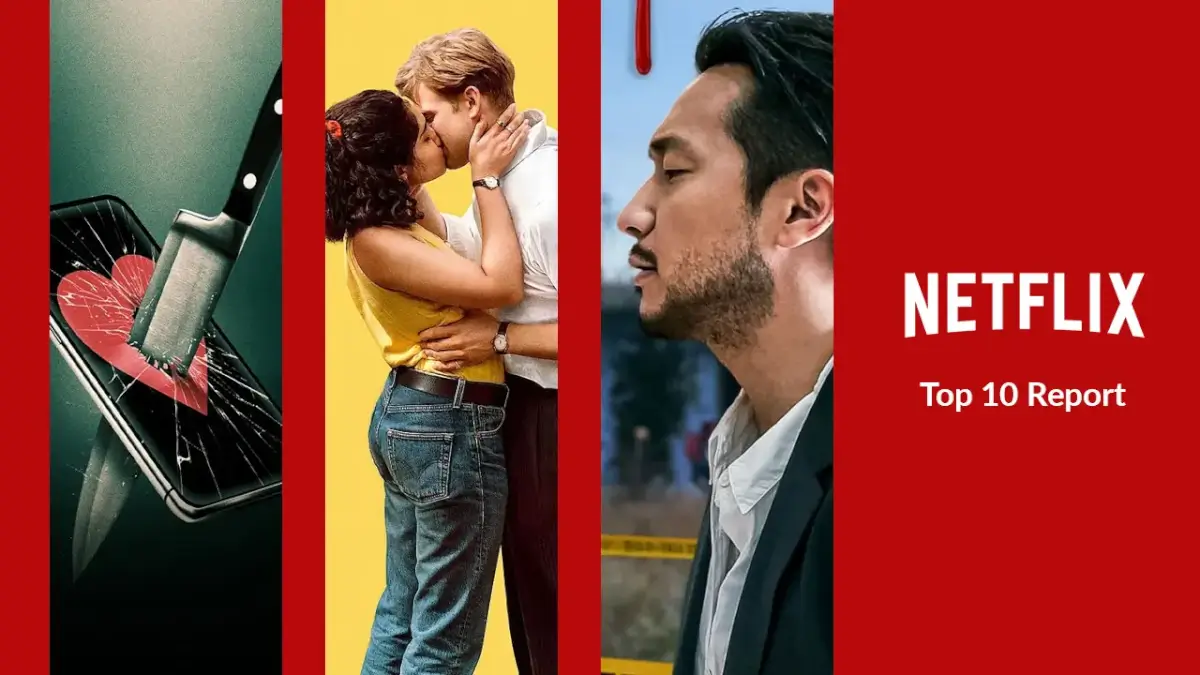
 Rating: TV-MA
Rating: TV-MA